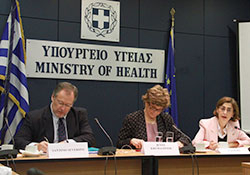The WHO Regional Office for Europe conducts a joint health and migration mission in Greece on International Migrants Day

WHO
The Ministry of Health of Greece through the Hellenic Center for Disease Control and Prevention (HCDCP/KEELPNO), and the World Health Organization (WHO) Regional Office for Europe through the project ‘Public Health Aspects of Migration in Europe’ (PHAME) have conducted a mission in Greece on 15–19 December 2014 aimed at strengthening the health-system capacity to better respond to the public health needs of large influxes of migrants.
Migration is one of the most complex phenomena European countries are facing nowadays. Large influxes of migrants coming from African and Middle Eastern countries are posing great public health challenges to health systems across the Mediterranean. These influxes are the result of long-term instability and threats to human life in the countries of origin, such as armed conflicts and poor living conditions. The unpredicted Arab Spring and consequent armed conflicts in neighboring countries have caused and keep causing mass-population movements of migrants.
Strengthening the public health aspects of migration in Greece
The public health challenges connected to migration affect both the migrant and resident population. Given the multi-sectoral nature of this phenomenon, countries’ efforts to address this complex phenomenon in an effective way must involve all sectors across the government. Following this whole-of-government approach, the WHO Regional Office for Europe, the Ministry of Health of Greece and KEELPNO met with key stakeholders including governmental actors (Ministry of Interior, Ministry of Public Order and Civil Protection or Ministry of Foreign Affairs), international organizations (UNHCR, IOM, Frontex) and non-governmental actors. Field visits were also organized to the First Reception and Detention Centers in Evros and the islands of Samos and Lesvos, where local authorities were also interviewed.
The mission team was composed of a wide range of professionals and collaborating organizations. Besides staff from the WHO Regional Office for Europe, WHO temporary advisors were present from the International Centre for Migration Health and Development, the European Centre for Disease Prevention and Control, KEELPNO and the Ministry of Spain.
The main objective of this exercise is to identify Greece’s current and potential response to the public health needs and challenges of large influxes of migrants, as well as to identify possible areas for improvement and best practices. As a direct result of this collaboration, a joint report will be produced by the Ministry of Health of Greece, KEELPNO and the WHO Regional Office for Europe. This publication will include the main outcomes of the exercise and a number of recommendations for future collaboration.



